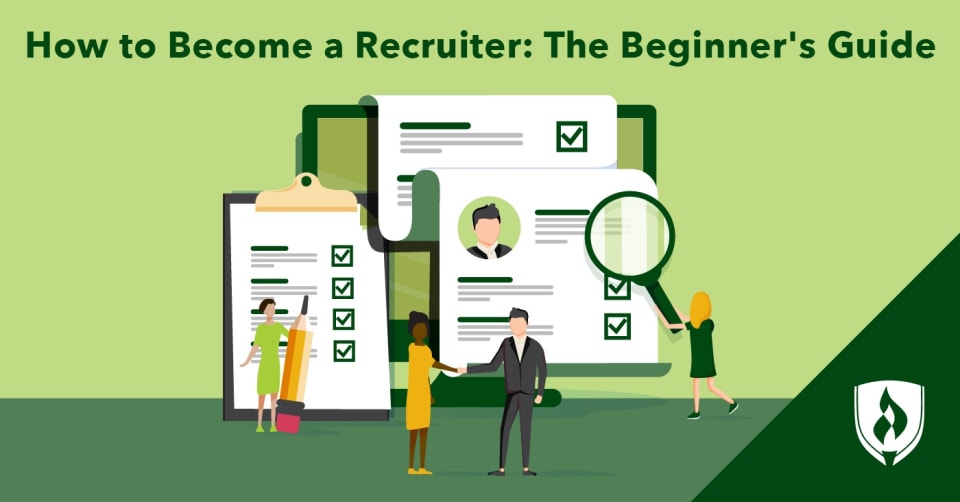
There’s no counting the number of respectable careers out there that can lead someone to success. But there’s one that stands out if you’re looking for a career that puts your ambition, work ethic and people skills to good use: recruiting.
You think you understand the gist of a recruiter’s job, but what do they actually do all day? The questions don’t stop there. How do you get started as a recruiter, what types of people do well in this role and are there opportunities for advancement?
We get it—you need all these answers and more if you’re going to commit to recruiting as your new career. We spoke with professional recruiters to get honest answers for all your burning questions. Read on to discover if this could be the career for you!
What is a recruiter?
A job recruiter—sometimes called a talent recruiter or, informally, a “headhunter”—is a human resources (HR) professional tasked with identifying and pursuing candidates for potential job openings. Think of them as the matchmakers of the business world. Talent recruiters can work directly for an organization or business, or they may provide their services on behalf of a third-party organization, like staffing agencies.
Recruiters play a key role in filling important, hard-to-fill positions where competition for qualified candidates is strong. “Recruitment is all about helping talented people get the jobs and salaries they deserve,” says Anjela Mangrum, founder of Mangrum Career Solutions. “Moreover, you’ll be responsible for building the best teams that can define the future of companies.”
This takes a lot more work than simply putting up an online job posting! Recruiters are professional networkers and problem-solvers, spending much of their days calling or emailing with their professional contacts to see which connection might lead them to the perfect fit for their organization’s next big hire.
A day in the life of a recruiter might also include writing job descriptions, meeting with company managers to determine the skills and characteristics they’re looking for in a candidate, setting up interviews and conducting phone screenings.
Why should I become a recruiter?
Now that you have a better idea of what a recruiter does, you need to understand why it should be on your radar as a potential career. As it turns out, there are a number of reasons that make recruitment a career worth considering!
It’s a rewarding career
Recruiting might not be the first career that comes to mind when you think of jobs that are personally fulfilling, but we spoke with many recruiters who say this job is the most rewarding career they’ve ever had.
Not only do recruiters quite literally match people with their dream jobs, but they also have opportunities within the field to expand their own knowledge. “You can meet all sorts of interesting people, learn about things you didn’t know existed,” says recruiter Leticia Naranjo of DistantJob, who has learned plenty about programming languages thanks to her work as a technical recruiter. “It is undoubtedly one of the most enriching professions there is.”
There are advancement opportunities
A recruiter’s career doesn’t have to begin and end with the same job title they start with on day one. Those who work internally for a company can often advance to higher positions, like hiring manager, team leader, hiring director or even a regional leadership position if it’s a large company, according to Naranjo.
Entrepreneurship is another option on the table for experienced recruiters. Lewis Mayhew, CEO of South Scaffolding, notes that it’s becoming more popular for recruiters to strike out on their own as self-employed freelancers or as entrepreneurs who open their own talent agencies.
What types of skills and personality traits do recruiters need?
A recruiting career is starting to look pretty good—but that doesn’t mean it’s the right job for everyone. Successful recruiters tend to share some common transferable skills and personality traits.
These are some of the skills and characteristics our expert recruiters say come in handy on the job:
- Not all recruiters are true extroverts, but they should be comfortable spending much of their day talking with others and making genuine connections, even with those they don’t know.
- The best recruiters can put themselves in other people’s shoes. This helps them match job candidates with just the right position and understand what’s motivating them.
- Since recruiters spend so much of their time talking with others, both verbally and through text, it’s no surprise that they rely on top-notch communication skills to make connections.
- Active listening. Good recruiters know when to stop talking and listen carefully to clients and candidates. This gives them a solid understanding of what each party is looking for.
- Not every job opening will be easy to fill, and recruiters will have to rise to the challenge rather than becoming discouraged. A persistent attitude can also help recruiters become high achievers—boosting earnings for themselves and their organization.
Of course, there’s no one-size-fits all personality for effective recruiters. One of the best parts of the job is the flexibility for all types of people from various backgrounds to adapt to what the role requires. Additionally, technical knowledge in a niche industry can be a useful asset—for example, the information technology field often has tough-to-fill roles that need knowledgeable recruiters in order to find the right skill sets.
How do you become a recruiter?
Getting started in a recruiting career isn’t as straightforward as many other career paths. The good news is this means you can leverage nearly any background into a successful recruiting career.
“Working in HR is certainly a big plus, but isn't required,” Mayhew says. He adds that you can do well in this field with either specific knowledge of a particular field if you want to be a specialist recruiter or a variety of work experiences if you’d prefer to be a generalist.
“Since interpersonal skills are key to becoming a successful recruiter, experience in client-facing roles, such as HR and customer service, could make getting your first gig easier,” says Mangrum. Naranjo agrees, adding that any type of experience with sales can be helpful because “you’re so used to approaching people. It comes naturally to you.”
As for education, there is no standard requirement, although some employers may prefer candidates who have a Bachelor’s degree, according to the BLS.1 The degree program itself could vary, with our experts advising courses in Human Resources, Business Management, communications and even psychology.
Aspiring recruiters may also want to join a professional organization, like the Society for Human Resource Management (SHRM)™. SHRM offers a number of professional certifications to boost your resume. Membership will not only allow you to connect with other professionals in your industry, but it’ll also show prospective employers that you’re serious about your recruiting career.
Are you ready to become a recruiter?
Now that you have a better idea of how to become a recruiter, can you see yourself filling those shoes? Recruitment has so much to offer, it might be easier to ask why you wouldn’t consider this career option!
If you can’t come up with a decent answer to that question, then you owe it to yourself to consider this career path. Learn more about how you can take the first step toward becoming a recruiter by visiting the Rasmussen University Human Resources and Organizational Leadership degree program.
1Bureau of Labor Statistics, U.S. Department of Labor, Occupational Outlook Handbook, [information accessed March 2021] www.bls.gov/ooh/. Employment conditions in your area may vary.
SHRM is a registered trademark of Society for Human Resource Management, Inc.
EDITOR’S NOTE: This article was originally published in 2017. It has since been updated to reflect information relevant to 2021.




